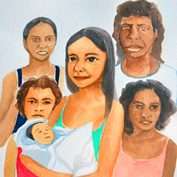Improving perinatal outcomes for Aboriginal and Torres Strait Islander families

Three investigators from Murdoch University's School of Psychology and Exercise Science, will pilot an early intervention program which aims to close the gap in perinatal care between Aboriginal people and non-Aboriginal people, improving the outcomes for future generations.
The program titled 'Baby Coming – You Ready?' has been made possible by a $220,000, two year grant from The Ian Potter Foundation and will provide an evidence-based alternative mental health screening tool to the Edinburgh Postnatal Depression Scale (EPDS), the standard perinatal mental health assessment protocol used in Australia.
Professor of Aboriginal Health and Wellbeing Rhonda Marriott will lead the project and said there was a need to design mechanisms that could validate perinatal mental-health and wellbeing screening, assessment, and management processes for Aboriginal and Torres Strait Islander mothers and fathers nationally.
"The benefits and outcomes of this research project are potentially far-reaching and intergenerational," Professor Marriott said.
"The perinatal years are critical to the foetal development, future mental health and wellbeing of children, families and communities."
The research project will digitise and pilot the 'Baby Coming – You Ready?' paper-based rubric developed during Jayne Kotz's Doctor of Philosophy research project 'Kalyakool Moort – Always Family' conducted through Murdoch University, as a culturally-safe mental-health practice for Aboriginal parents.
"Kalyakool Moort – Always Family explored screening practices for depression and anxiety and ways to strengthen familial support for Aboriginal parents-to-be during pregnancy and after the baby is born," said Ms Kotz.
"A key finding of the research was that there was no evidence that the EPDS was effective or culturally safe. Moreover, that there was some evidence that Aboriginal women demonstrated a protective response bias when completing the EPDS."
Chief Executive Officer Craig Connelly said The Ian Potter Foundation was delighted to provide the funding boost to the $880,000 research project.
"The 'Baby Coming – You Ready?' research project aligns with The Ian Potter Foundation's general principles to fund prevention rather than cure and to support and encourage excellence. We hope this project will make a significant contribution to improving outcomes in this important and complex area," Mr Connelly said.
Professor Marriott said it is vitally important all Aboriginal and Torres Strait Islander women have access to culturally safe, relevant and responsive high quality and effective perinatal care that is free of racism and inequality.
"Measurable indicators of the success of 'Baby Coming – You Ready?' have been established for mother, clinician and baby, with improvements in attendance to antenatal appointments, social and emotional wellbeing for Aboriginal expectant and new parents' anticipated, along with better birth and development outcomes for babies," added Professor Marriott.
"This culturally-safe rubric uses a therapeutic assessment framework in which client and clinician engage in joint reflection on multiple issues in plain language. It encourages open engagement and self-evaluation, fostering understanding for both users."
'Baby Coming – You Ready?' will commence in July of 2016.

















